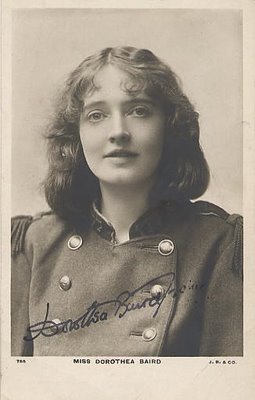Sunday, March 19, 2006


Dorothea's World
The first time I saw this unusual photo, I came under its spell. I simply had to find out more about the subject. Who was this girl with the Sgt. Peppers costume and the rapturous expression? I began web-sleuthing and, bit by bit, the results began to develop into a fascinating set of facts.
The girl in the picture was none other than Dorothea Baird, star of the British Stage at the turn of the last century. Her costume and expression were due to her posing “in character” as “Trilby”, a hypnotized young woman from Bohemian
It has been said that du Maurier’s “Trilby” and Henri Murger’s Scènes de la vie de Bohème were the two most important 19th century works to explore “Bohemia”, the term used to represent the community and relationships of young artists. The Murger book was the foundation for the most lasting of any work on the subject, Puccini’s “La Boheme”. The Trilby drama also cast it’s weight on the culture of the late 90’s, influencing taste and fashion. Trilby smoked cigarettes on stage – a shocking sight in that era. Part of her costume was a hat, odd for it’s time, which came to be called the Trilby Hat. A town in
Born in
Henry Broddrib Irving was the eldest son of one of Britain’s theatre icons, Sir Henry Irving. Sir Henry was, at that time, the only actor to ever be knighted by the Queen and was a man of immense energy and creativity. His son, Henry, was studying Law at
Sir Henry must have been very pleased with his new daughter-in-law, and must have recognized her sizeable talent. Though she was definitely “bonnie” in appearance, there were far deeper qualities beneath the surface. Underlying her talent was the gift of timing, a huge stage presence, and a large melodious singing voice all combined with respect for good drama and imbued with a “trouper’s” attitude. She must have had a great capacity for getting into character without losing her own personality in the process. These great professional qualities were still not the end of Dorothea’s story.
Enter one, Beerbohm Tree. Yes, that is his name. It’s interesting that a man with so fanciful a name should be such a mighty figure in the Theatre of his day. Beerbohm was, like Sir Henry, a stellar actor, and an energetic theatre promoter. He had traveled to
In 1896, Dorothea and Henry were married.
Another of Dorothea’s blockbusters came in 1904, when she became “Mrs. Darling” in the original stage production of J.M. Barrie’s, “Peter Pan”. This first staging featured Nina Boucicoult as Peter It opened at Duke of
Second child, Elizabeth, would become an actress, following her Mother’s lead. She even played “Trilby” in a 1921 remake. Eventually she would become Lady Brunner and give guidance and support to many worthwhile causes including the “Keep
There would be one more movie in Dorothea’s life. “Motherhood” was made in 1917, well into her retirement. Dorothea wrote the screenplay and played a small part in the picture. This film was part of Dorothea’s new life in retirement in which she dedicated herself to charitable causes. What little I’ve been able to find out so far tells of her being especially involved in issues of Infant welfare and surely, “Motherhood” would have been part of that effort. Dorothea’s work, which has a Dickensian tone to it, can be found in web searches, but only the sketchy details are available. Few icons of the Theatre ever made it to the screen. To fill a huge Theatre with the essence of drama required a great energy. Some would call it over-acting, perhaps. It is quite distinct, however, from the under-acting required in traditional movie making. It probably took actors a long time to discover that fact. Also, movies seemed liked upstarts compared to Shakespeare and it’s hard to imagine Henry and Dorothea being happy with movie making.
In 1913, Dorothea began her retirement period. It seemed to many that her exit from the stage was unnecessarily early, but she had other things on her agenda and the period after The Great War would be an entirely new era in her chosen art. Her husband, Henry, died in 1919, but had realized great success in his second profession. He became known for his writing as well as his acting, having published a hugely successful book in 1918 about the law and criminality entitled “The Book of Remarkable Criminals”. In the text, Henry writes about the nature of King Claudius in “Hamlet”: The most successful, and therefore perhaps the greatest, criminal in Shakespeare is King Claudius of
How Claudius got over the great difficulty of all poisoners, that of procuring the necessary poison without detection, we are not told; by what means he distilled the 'juice of cursed hebenon'; how the strange appearance of the late King's body, which 'an instant tetter' had barked about with 'vile and loathsome crust', was explained to the multitude we are left to imagine. There is no real evidence to show that Queen Gertrude was her lover's accomplice in her husband's murder. If that had been so, she would no doubt have been of considerable assistance to Claudius in the preparation of the crime. But in the absence of more definite proof we must assume Claudius' murder of his brother to have been a solitary achievement, skillfully carried out by one whose genial good-fellowship and convivial habits gave the lie to any suggestion of criminality. Whatever may have been his inward feelings of remorse or self-reproach, Claudius masked them successfully from the eyes of all. Hamlet's instinctive dislike of his uncle was not shared by the members of the Danish court. The 'witchcraft of his wit', his 'traitorous gifts', were powerful aids to Claudius, not only in the seduction of his sister-in-law, but the perpetration of secret murder.
Dorothea lived until 1933. There is still a lot of gaps in her story and when more pieces of the puzzle come to light, Musevision will report on them.
Labels: Dorothea Baird Trilby